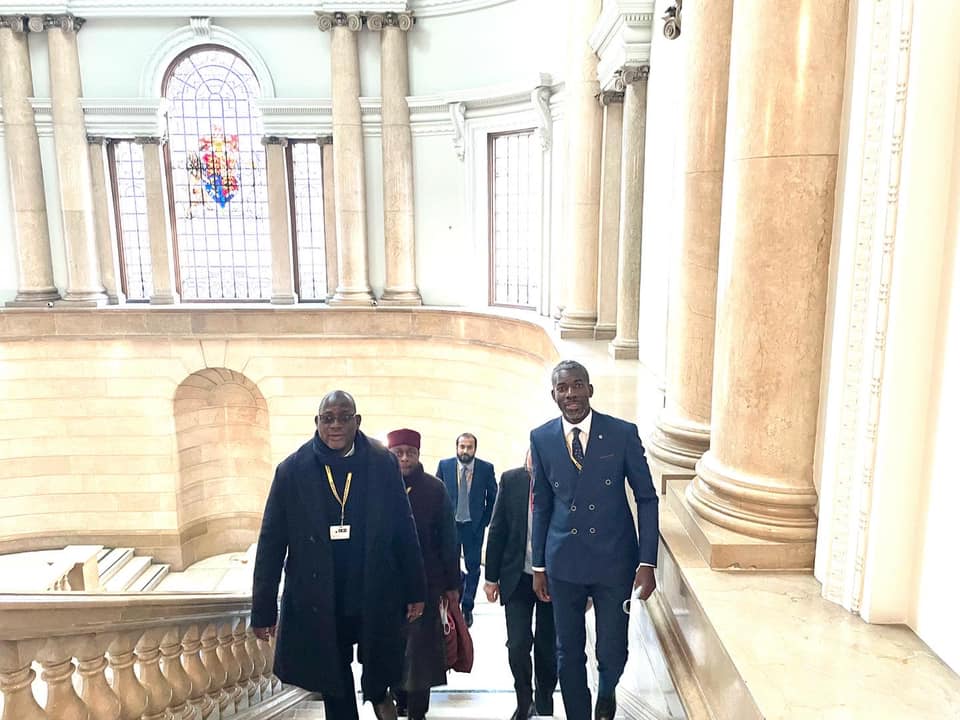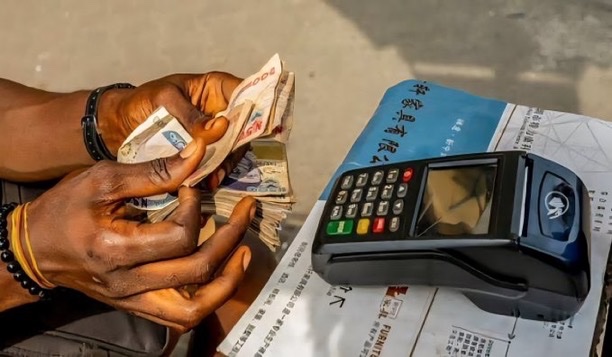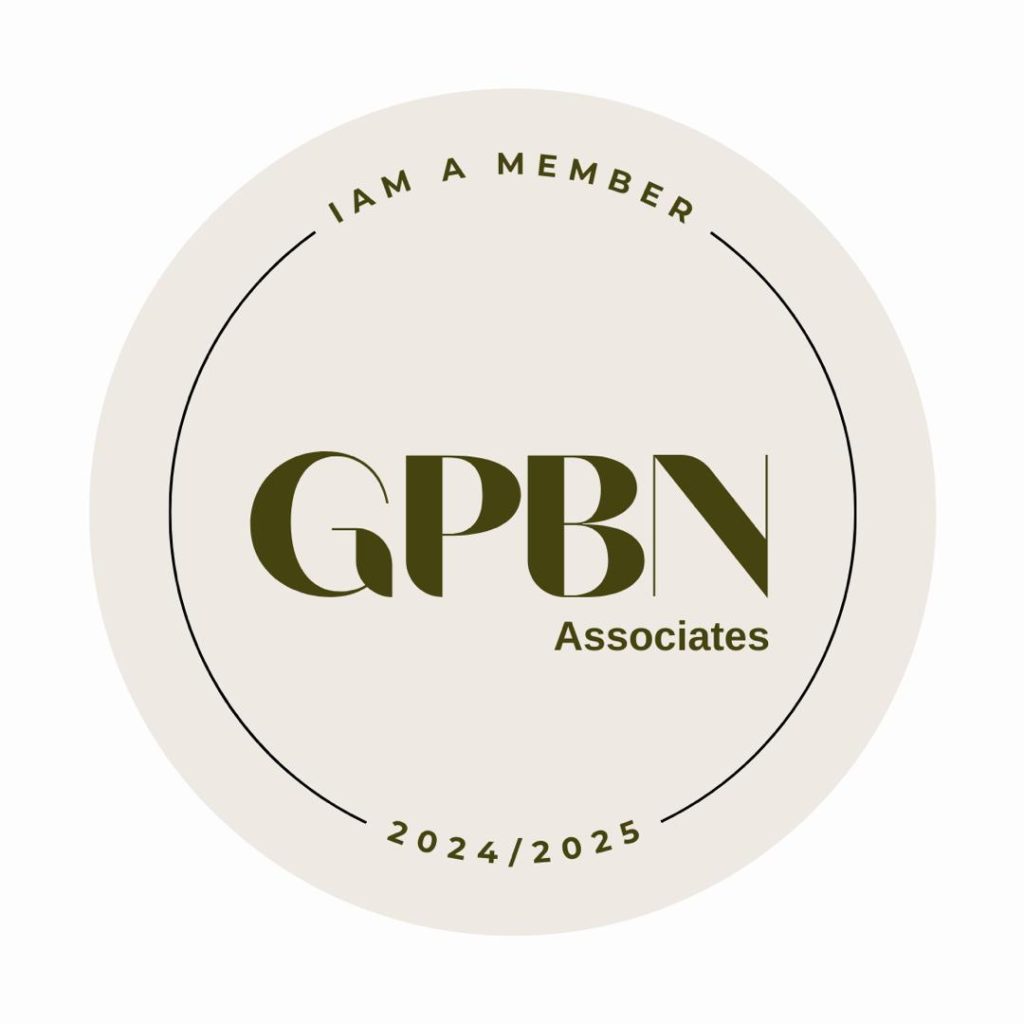

Feature
Muhammad Nami’ 2 years as FIRS Executive Chairman
On assumption of office, the Executive Chairman of the Federal Inland Revenue Service (FIRS), Mr. Muhammad Nami, drew up a four-point objective as a template for his mission to reposition the Service, for efficient service delivery. Hitherto, the Service had operated without a clear direction thereby dampening the morale of the staff.
The cardinal objectives of his administration are: Rebuilding FIRS institutional framework; Collaboration with stakeholders; Making FIRS a Customer-centric institution and Making FIRS a Data-centric institution.
These objectives indubitably correlate with the three core areas of a tax system, which are, tax laws, tax policy and tax administration. A tax system works better by having a robust rapprochement with critical stakeholders, a properly nurtured and sustained customer-centric sentiment and a bias for data analysis and utilisation. All of these can blend well within the framework of a properly positioned and structured corporate institution.
It is to achieve all these that Mr. Nami applies himself diligently,since he took over the mantle of leadership at FIRS. The range of initiatives and reforms he has implemented thus far bespeak of him as a focused and devoted tax administrator and a team player, who understands how to harness human and financial resources to improve the country’s tax system.
Nami’s Approach to Improving Nigeria’s Tax System
The current Management at FIRS led by Mr. Muhammad Nami,realising the strategic importance of a tax system to the nation’s economy immediately mapped out strategies on how to reposition the FIRS for greater service delivery. It thus adopted a range of initiatives aimed at the overall strengthening of the tax system. These strategies covered the three core areas of a tax system: tax laws, tax policy and tax administration.
Tax Laws
It is an obvious fact that there is no taxation without legislation. Every round of tax reform must therefore begin with a review of the legal framework. As of the datethe new Executive Chairman assumed office, the 2019 Finance Bill was already in the works but had only been passed by the House of Representatives. Through concerted efforts by the new Management, the Senate passed the Bill on 11thDecember2019 and presidential assent was given on 13thJanuary 2020 and the Finance Act 2019 came into effect, setting the tone for several other reform initiatives by the Nami-led FIRS.
The Finance Act 2019was a wholesale amendment to seven different tax legislations namely: the Companies Income Tax Act, Value Added Tax Act, Capital Gains Tax Act, Stamp Duties Act, Customs and Excise Tariff Act, Petroleum Profits Tax Act and Personal Income Tax Act.
Small and medium businesses were the biggest beneficiaries of the reforms introduced by the Companies Income Tax Act (amendment). Specifically, the amendment divides companies into three categories for taxation. These are small, medium and big companies. Companies with an annual turnover of less than 25 million naira (small companies) are exempted from payment of corporate tax. Companies with an annual turnover of between ₦25 million and ₦100 million (medium companies) are taxable at 20% of assessable profits. Companies with an annual turnover of ₦100 million and above (big companies) remain taxable at the rate of 30% of assessable profits. This reform intervention recognises that small and medium businesses are the main drivers of job creation and economic growth. The reform is therefore aimed at reducing operational cost, encouraging recapitalisation and business expansion by small and medium companies.
Another major reform is with the Value-Added Tax. In addition to clarifying certain ambiguous provisions of the VAT Act, the amendment increased the rate of VAT from 5% to 7.5%. The concomitant reduction in Corporate Tax rates on one hand and an increase in the rate of Value-Added Tax, on the other hand, is consistent with the National Tax Policy which aims at a gradual shift from direct to indirect taxes. The guiding principle behind this stipulation in the National Tax Policy is that indirect taxes potentially offer higher yield while remaining cheaper to administer than direct taxes.
Within the Year 2020 and as a follow-up measure to strengthening the legal framework, a Committee was constituted to further review all relevant tax laws. As a result of the Committee’s work, Draft Bills with amendments to the Federal Inland Revenue Service Establishment Act, the Value Added Tax Act and the Finance Act 2019 were prepared and submitted to the National Assembly (NASS) for further review.
In addition, within the same year, 13 information Circulars were also developed and released as follows:
- Taxation of Non-residents in Nigeria
- Taxation of seafarers onshore and offshore platform workers
- Taxation of companies involved in shipping, air transport and cable undertakings
- Taxation of Real Estate Investment companies
- Guidelines for filing income tax returns by foreign companies
- Circular on clarification for taxation of insurance companies
- Circular on clarification on commencement and cessation of business and business reorganisation
- Circular on tax implication of the operation or regulated securities lending transaction
- Circular on stamp duties
- Circular on value-added tax
- Clarification on sundry provisions of the Finance Act 2019 as it relates to CITA
- Guidelines on the tax treatment of section 27(C) of Companies Income Tax Act (CITA) on the deductibility of Foreign Tax Framework for the implementation of the country-by-country reporting in Nigeria.
Tax Policy
To minimise the incidence of double taxation and to further facilitate international trade and investment between Nigeria and the rest of the world, the FIRS in collaboration with the Federal Ministry of Finance, Budget & National Planning engaged in bilateral/ multilateral agreements.
In 2020, FIRS concluded the negotiation of the Avoidance of Double Taxation Agreements with Turkey. Negotiations are also at different stages with the following countries: Hong Kong, Saudi Arabia, Cyprus, Iran, Germany, Switzerland, India, Botswana, Japan, Greece, New Jersey and Russia. These will be concluded as soon as the few outstanding issues have been resolved.
In the year under review, Nigeria has an active ADTA agreement with 16 countries, namely: South Korea, Spain, Sweden, Singapore, France, Mauritius, UAE, Qatar, Kenya, Morocco, Ghana, Cameroon, Turkey, Sudan, Gambia and Denmark.
Another key tax policy issue which the Management of the Service continues to focus on is that of transfer pricing. The Management has, by way of follow up to the introduction of the Income Tax (Transfer Pricing) Regulations 2018, issued Demand Notes totaling 1.074 billion naira on 222 companies for failing to file their transfer pricing returns in line with the requirements of the Regulations. 54 companies paid penalties imposed on them and these amounted to ₦47.433 million. Currently, the Service is involved in several audits that have the potential for substantial revenue yield resulting from adjustments and additional assessments.
The Service also maintained its relationship with ATAF, WATAF, CATA and the OECD and organised a WATAF workshop on Risk Management in Bamako, Mali in June 2020.
Tax Administration
During the 2020 fiscal year, FIRS continued the implementation of various administrative measures to enhance revenue collection to achieve its target. From the onset, the new Executive Chairman identified four cardinal pillars to drive his reform interventions in the area of tax administration.
These objectives are: Rebuilding FIRS Institutional Framework, Robust Collaboration with Stakeholders, Building a Customer (Taxpayer)-Centric Institution, Building a Data-Centric Institution, Participation in international tax engagements.
On Rebuilding FIRS Institutional Framework:
The Management has been committed to building and strengthening the capacity of the Departments and Units of FIRS to deliver their mandates on a long term and sustainable basis. In line with this, the Board approved a new structure for the Service on 17th January, 2020. The new Organogram is composed ofsixGroups and 32 Departments including the Internal Affairs Department that reports directly to the Executive Chairman.
Taxpayer Segmentation has been re-introduced. The Audit and Investigation departments were also reviewed for effectiveness.
The Annual Corporate Plan Retreat was reintroduced and it held between 7th and 8th February, 2020 with the theme “Repositioning FIRS for Efficient Service Delivery.” The 2020 Corporate Plan was approved by the Executive Chairman, FIRS and exposed to the staff at the headquarters.
The Intelligence, Strategic Data Mining & Analysis Department (ISDMA) was established to deploy technological tools analyze tax data and distil for improved assessment of taxpayers.
The Tax Incentive Management Department (TIMD) was also established to manage, implement and report on tax incentives as provided by relevant extant laws and regulations. This department is specifically in charge of the tax affairs of companies/ enterprises enjoying tax exemptions and holidays. Companies enjouying pioneer incentives, NGOs, Cooperative Societies, companies in Export Processing Zones, Free Trade Zones, Oil and Gas Export Processing Zones, those engaged in Downstream Gas Utilization and all others enjoying tax holidays are being managed by this department to forestall revenue leakages, such that companies, enterprises do not use their statuses as a cover to earn taxable income and refuse to pay tax on those income.
The National Tax Week:
The FIRS hosted the first ever National Tax Dialogue in January 2020. The event brought together leaders, institutional stakeholders and tax experts from across the world to discuss matters relating to improving taxation especially in Nigeria. Attendees included President Muhammadu Buhari, AFdB President, Dr. Akinwunmi Adesina, Executive Governor of Ekiti State, Dr. Kayode Fayemi, Executive Secretary of the African Tax Administration Forum, Mr Logan Wort, among others.
The Executive Chairman has approved that a week at the beginning of every year be set aside as the National Tax Week, to host events on tax education awareness, discuss contemporary tax matters, and proffer solutions to fiscal challenges.
On Collaboration with the Stakeholders:
The objective in this regard is to foster cooperation and collaboration between FIRS and key stakeholders in the Nigerian Tax System to provide a unified view of our plans to eliminate critical bottlenecks which hitherto impede efficient tax administration. Some of the stakeholders include:
Federal Ministry of Finance
The collaboration with the Federal Ministry of Finance on the recovery of tax debt from contractors or tax debtors that were uploaded on the FMF (GIFMIS platform) has yielded recoveries of over N500 million.
Corporate Affairs Commission
Through inter-agency collaboration, the Corporate Affairs Commission has provided integration to the Service on its information system for data reporting via the Application Programme Interface. This enables the FIRS to track and bring new corporate taxpayers into the tax net; generate taxpayer-identification number for new taxpayers at the point of incorporation, issue a certificate of incorporation and improve efficiency in the administration of stamp duties.
Security Agencies
The Service, through collaboration with the Economic and Financial Crimes Commission; the Department of State Security Services and the Nigeria Police Force established a joint task team known as the Special Crimes Division. The Division is responsible for intelligence gathering, joint investigation and enforcement activities relating to tax evasion and tax fraud.
In addition to these collaborative engagements, the new FIRS Board through the Technical Committee of the Board set up a Committee and tasked it with the following terms of reference:
- Review all existing memorandums of understanding between the Service and its stakeholders,
- Prepare new MOUs for consideration, and
- Recommend other agencies/stakeholders the Service may enter into a MOU with to deepen stakeholder collaboration.
The key objective for stakeholder collaboration is information and intelligence sharing to enhance effective and efficient tax administration. The MOUs are intended to provide the framework, scope and obligations for such collaboration.
MDAs
The Service continued to engage with and sensitise many functionaries of Federal & State Government MDAs in a bid to make them more aware of their tax obligations and ensure improved tax compliance.
On Building a Customer-centric Institution:
Making FIRS “customer-centric” entails building an institution that is viable for ease of doing business by focusing on efficient service and providing a positive customer experience on all tax compliant processes.
In line with this, the following measures were put in place for the period being reviewed:
- Taxpayers facing challenges in sourcing for FOREX to offset their liabilities are given the option of paying in Naira at the prevailing Investors & Exporters (I & E) FOREX window rate on the day of payment.
- Palliative measures to remove penalty and interest on the following category of debts.
- Self-Assessment filing.
- Tax Audit, Tax Investigation and Desk review assessments.
- Approved instalment payment plans under VAIDS.
- Extension of VAT returns filing to the last working day of the month.
- Extension of CIT returns filing by one month.
- Filling of returns with the possibility of delayed delivery of audited accounts component till 2 months after revised filling date.
- Enhancement of the capabilities of various e-platforms for tax returns filing, tax payments, receipting and application for Tax Clearance Certificates.
The period for filing personal Income tax annual returns (Military, Police, Foreign Service officials etc.) extended to 30th June 2020.
The e-filing process has been made much simpler, user friendly and robust for the taxpayer to take advantage of instead of visiting tax offices, taxpayers have been provided with a dedicated email address to submit documents online.
The late returns penalty (LRP) has been waived for taxpayers that pay early and file later. Supporting documents can also be emailed to the dedicated email address or submitted later to the tax office, for those who are not able to use the email facility.
On Building a Data-Centric Institution
Reliable data is indispensable in modern tax administration. The various modernisation projects embarked upon by the new Management are aimed at either improving the integrity of available data or generating data for informed decision making. As part of the new Management’s drive to make the Service a data-centric institution, the following strategies have been initiated:
Technological Reforms
The TaxProMax was developed and deployed. It is an in-house Tax Administration Solution, which covers the major processes of a tax administration system (Registration, Filing, Payment and Reporting) by the extant tax laws and IMF Tax Administration Diagnostic Assessment Tool (TADAT) standards. This solution became operational on 1st June 2020 and is in use in all FIRS tax offices.
MoU between FIRS and NIBSS on funds sweeping and settlement of all FIRS taxes to Federation Account at CBN is operational.
‘My Bank Statement’ application has been developed for the transmission of customers’ transactions.
FIRS has developed a portal for Deposit Money Banks (DMBs) to provide information of corporate customers transactions above ₦10 million and individuals above ₦5 million.
On the 6th of October 2021, the FIRS under Muhammad Nami was awarded the International Standard Organization (ISO) 27001:2013 certification. This affirms that the Services’ network is secure, the data processes and data it possesses are secure as well as the taxpayer information it holds and receives within Nigeria and across the world.
Tax Administration Challenges
The conduct of field tax audit and physical reconciliation of tax audit cases posed a serious challenge due to Covid-19.
Security challenges experienced in some parts of the country has slowed business activities thereby impacting negatively revenue collection.
Inadequate data from 3rd parties on non-compliant or unregistered taxpayers.
Tax evasion and tax avoidance.
A Sneak Peek into2011 – 2020 Collection Trends
The Service hadconsistently struggled to exceed the N5 trillion collection brick wall since 2012 when that barrier was first broken. Despite the best efforts of successive Management, collection per officer continued to fall.The table below provides a picture of FIRS’ performance from 2011 to 2020:
| Year | Collection Target (N’Billion) | Actual Collection (N’Billion) | % Target Achieved | Staff Strength | Collection Per Employee (N) |
| 2011 | 3,639 | 4,629 | 127% | 6,445 | 718,231,187 |
| 2012 | 3,635 | 5,007 | 138% | 8,265 | 605,807,623 |
| 2013 | 4,469 | 4,806 | 108% | 7,085 | 678,334,510 |
| 2014 | 4,086 | 4,715 | 115% | 6,624 | 711,805,556 |
| 2015 | 4,572 | 3,742 | 82% | 7,182 | 521,024,784 |
| 2016 | 4,907 | 3,304 | 67% | 7,182 | 460,038,986 |
| 2017 | 4,890 | 4,047 | 83% | 6,589 | 614,205,494 |
| 2018 | 6,747 | 5,320 | 79% | 9,388 | 566,680,869 |
| 2019 | 8,802 | 5,008 | 57% | 9,448 | 530,059,272 |
| 2020 | 5,077 | 4,952 | 98% | 11,000 | 450,181,3818 |
The various strategies introduced by successive Managements for sustained revenue growth were to no avail. A careful study of the tax environment shows that the way business is conducted has changed drastically over the years. The traditional “brick and mortar” business model has given way to online digital models. As such, tax administrative strategies that were built on manual processes continued to fail because under the law, the tax authority can only tax taxpayers and transactions that are physically located in its jurisdiction. Online transactions are beyond what physical eyes can see for taxation thereby resulting in the tax revenue leakages occurring in Nigeria.
Remember the saying, “it is impossible to continue to do the same thing, in the same manner, all the timeand expect a different result”.
Consequently, to track all physically invisible taxpayers and transactions, Management deployed the TaxProMax for tax administration beginning from June 2021.
Automating FIRS for Operational Efficiency
The FIRSEA, in section 25, provided for the deployment of technology in the tax administration processes. Consequently, the President, Commander-in-Chief of the Armed Forces of Nigeria, directed all government MDAs and businesses to grant FIRS access to their data systems for a seamless connection.
In compliance with the law and the presidential directive, Management deployed the TaxProMax Solution and established the Intelligence, Strategic Data Mining and Analysis Department. While the TaxProMax will serve as the flagship tool for mining data, it will be complemented by other tools that the ISDM department may deploy and the data engineers in ISDMA shall carry out necessary distillations.
Management is very grateful for the feedback received from stakeholders so far on the TaxProMax – many were very complimentary while a few others were critical. In response, Management directed an upgrade to the Solution’s functionality while the timeline for CIT returns filing due on 30th June 2021 was extended to 31st July 2021. It is heart-warming to report that the combined effect of both measures assisted the Service to achieve the collection feat of June 2021.
Contrary to the very gloomy picture being painted by a few pessimists, the TaxProMax has performed excellently. Its performance surpassed expectations when compared with the performance of previous systems that cost FIRS billions of naira. Every officer of the Service must be proud that the TaxProMaxwas wholly developed in-house by FIRS personnel.
Below is the summary of TaxProxMax’s performance as of 30th June 2021:
| E-Registration | 195,986 |
| e-Tax Receipts: | |
| e-Receipts (Local) | 431,120 |
| e-Receipts (Foreign) | 3 |
| e-Credit Notes (Local) | 408,227 |
| e-Credit Notes (Foreign) | 8,341 |
| e-TCC Issued | 58,881 |
The above statistics are exclusive of the June 2021 collection of CIT and Education Tax paid via the TaxProMax Solution.
June 2021 Performance
The collection performance for June 2021, contrary to what the Economists and pessimistssaid,surpassed that of June 2020. The Service collected over N650 billion in June 2021 as against N526.6 billion collected in the same month the previous year. This represents a 20% increase in collection over the 2020 figure.
The performance for 2021 is significant considering that the full effect of the over 5-month lockdown of 2020 became fully manifest in 2021 YOA. Despite this phenomenon, the Service out-performed June 2020 (which was based on 2019 accounts – a year that experienced no lockdown) by 58.9% after adjusting for the one-off payment of N90 billion by an E&P company and NCS VAT collection, usually in the range of N40 billion.
On Participation in International Tax Engagements
Nami’s leadership of the FIRS has also launched Nigeria and the FIRS to international tax spectacle. For the first time in history, Nigeria heads the Commonwealth Association of Tax Administrators (CATA). Nami was unanimously elected President by the 47-member country organisation on November 12, 2021 during the organisation’s General Assembly which held virtually. Nami becomes the 15th President of CATA and first Nigerian to be so elected and will occupy the office for a three-year tenure.
Nami has had an inaugural meeting as the CATA President in the United Kingdom. He is taking Nigeria’s ideals on tax administration including digitalisation, tax legislative reforms and his reputation on accountability and focus to the international scene.He further promised that as President of CATA he will mobilise member countries and other tax bodies to build capacity of tax administrators to tackle the challenges they face.
“One goal I hope to achieve as your President is to work hand-in-hand with member countries to expand the character of tax administration such that our work is in tune with today’s innovation and realities,” he stated.
In September, 2021 Nigeria hosted the 17th General Assembly and 10th Anniversary of the West African Tax Administration Forum (WATAF). The theme for the 2021 General Assembly of WATAF, was “The Taxation of the Digital Economy: Exploring Untapped Revenue Sources in Africa”.The General Assembly is the highest decision-making body of WATAF and consists of all heads of tax administrations of the fifteen member states. The FIRS graciously accommodates the office of Executive Secretary of WATAF which its staff, Babatunde Oladapo, is the Executive Secretary.
Nigeria is actively involved in other international tax engagements such as the African Tax Administration Forum (ATAF), Organisation for Economic Cooperation and Development (OECD) among others.
Resolution of the Squabble Among Tax Bodies in Nigeria
Over the years, precisely since 2004, some professional bodies in taxation and economy remained at loggerheads over areas of influence. This squabble took its toll on the economy because where there is no peace and unity, there is no progress. In May, 2021, Nami, a pragmatic administrator who has the progress of these bodies at heart put a machinery in motion which finally resolved the issue. The professional bodies are the Institute of Chartered Accountants of Nigeria (ICAN), the Chartered Institute of Taxation of Nigeria (CITN) and the Association of National Accountants of Nigeria (ANAN).
He said: “following the disagreement and various court disputes since 2004 to date, between ICAN, ANAN and CITN on issue of Tax practice, it became necessary that FIRS under my leadership should intervene by inviting the three sister professional bodies for amicable resolution.” The FIRS facilitated signing of a memorandum of association which was meant to provide an atmosphere in which the bodies could operate seamlessly “to support what FIRS does and also contribute to the improvement of the Country’s position on the ease of doing business index”.
That was the very first time, ICAN, CITN and ANAN came together on one platform to affix their respective hands and seals to a document and affirmed their commitment to the growth and development of tax administration, compliance and practice in Nigeria.
Conclusion
Total revenue remitted to various FIRS accounts with CBN at the end of the year 2020 stood at N4.95trillion. This amount shows a slight shortfall compared to the revenue target for the year, which was N5.07 trillion. This was because of the general economic depression, volatile exchange rates, prevailing global economic crises occasioned by the COVID-19 pandemic and poor tax culture among the populace.
As at 30th November 2021, the Service had collected over 5.03 trillion Naira, being 85% of the national tax target. It projects to meet and even overshoot its target by 31st December 2021.
Feature
Ex-Oyo Governor Ladoja Installed as 44th Olubadan of Ibadan

The odyssey of Senator Rashidi Adewolu Ladoja to the ancestral throne of Ibadan is not only historic but profoundly political, laced with trials and triumphs.

History often unfolds slowly, like a scroll revealing one line at a time. In Ibadan, a city steeped in tradition and resilience, history has once again taken a defining turn.
Oba Rashidi Adewolu Ladoja, former governor of Oyo State, businessman, politician, and activist, is now preparing to ascend the exalted throne as the 44th Olubadan of Ibadanland.
His decades-long journey, filled with trials, victories, and service, tells a compelling story of destiny, courage, and legacy. From political powerhouses to royal lineage, from boardrooms to the battlefields of democracy, Ladoja’s life blends tradition with transformation. His ascension is not only personal fulfilment but also a cultural and historical moment for Ibadanland.
Indeed, his coronation stands as a milestone, a testament to resilience, faith, and destiny fulfilled. On September 26, 2025, Oba Ladoja will be crowned the 44th Olubadan of Ibadanland, closing a circle that began 34 years ago when he became Mogaji of his family compound in Isale-Osi. But this is no ordinary coronation; it is the culmination of a saga defined by ambition, resistance, exile, betrayal, resilience, and ultimately, triumph.
Road to Royalty: From Mogaji to Monarch
It began in 1991 when Rashidi Ladoja became Mogaji (family head) of the Arusa compound in Isale Osi, a deeply rooted quarter in Ibadan South-West Local Government Area. That symbolic beginning marked the first step on Ibadan’s rigorous 36-step chieftaincy ladder, reserved for those destined to wear the revered crown.
The Ibadan succession system is unique among Yoruba kingdoms. Unlike other traditional stools where royal families are narrowed to specific lineages, the Olubadan system is remarkably open and transparent. Two lines of succession, the civil (Otun) and the military (Balogun), run concurrently, and candidates rise step by step until the next in line becomes Olubadan. It is an orderly system that rewards longevity, patience, and service, making the throne one of the most respected in Yorubaland.
On October 1, 1993, Ladoja was installed as Jagun Balogun Olubadan, formally entering the military line of succession. Over the next 31 years, he advanced steadily, surviving political turbulence, personal setbacks, and traditional disputes. Few endure the politically charged and physically demanding journey to the top, but Senator Ladoja did — with grit, patience, and determination.
“I never imagined destiny would call me to the throne at this time. It’s been one of patience, perseverance, and grace,” Oba Ladoja told a gathering at his Bodija residence after his official nomination.
Political Elite Meets Royal Heritage
In a city of warriors and statesmen, Oba Ladoja is the first former governor and senator to become Olubadan.
Trained as a chemical engineer in Belgium, he made his mark in oil, shipping, banking, agriculture, and transport before rising as a political force.
During the short-lived Third Republic, he was elected senator on the platform of the defunct Social Democratic Party (SDP). In 2003, he defeated incumbent Lam Adesina to become Governor of Oyo State on the platform of the Peoples Democratic Party (PDP).
Two years later, he was impeached in what many described as a conspiracy driven by then-President Olusegun Obasanjo and political strongman, Lamidi Adedibu. His reinstatement by the Supreme Court after 11 months in exile was more than a legal victory — it was a political resurrection. It cemented his reputation as “the indomitable warrior”, a man political opponents could not erase or ignore.
That resilience, combined with patient navigation of Ibadan’s chieftaincy system, has now borne fruit.
“It has been a bumpy journey filled with trials, but only made possible by the grace of God,” he told jubilant supporters.
Defiance and Reconciliation
Ladoja’s political career was often defined by principles that put him at odds with powerful figures.
In 2018, when then-Governor Abiola Ajimobi crowned Ibadan High Chiefs as kings, Ladoja stood alone in defiance. He rejected what he called a “carton-paper-made” beaded crown, declaring that the only crown worthy of him was the Olubadan’s. His refusal sparked years of political and legal confrontation.
“Why should I wear a crown not recognised by tradition?” he asked. “The throne is not for the desperate.”
Yet, in August 2024, in a radio interview, he softened his stance, saying unity was more important than pride: “The voice of the people is the voice of God. I am ready to accept the beaded crown if it will bring peace and allow me to serve the people of Ibadan.”
That statement shifted the atmosphere. His colleagues in the Olubadan-in-Council rallied behind him, and he was soon unanimously nominated and approved by Governor Seyi Makinde as the 44th Olubadan.
Unlike his clashes with Ajimobi, Ladoja’s relationship with Governor Makinde has been cordial and strategic. Makinde’s prompt approval of his nomination reflected a convergence of political and traditional power, a necessity in Oyo State where the Olubadan stool carries both cultural influence and political weight.
The Crown and the City
Ibadan is no ordinary city. It is the largest traditional Yoruba urban centre and the historic political capital of the old Western Region. The Olubadan, though largely symbolic, wields influence over millions.
For Oba Ladoja, this reign is not ceremonial. It is an opportunity to redefine the stool, blending cultural authority with political wisdom.
“I pray that my reign shall bring peace, prosperity, and progress to Ibadanland,” he said, calling for unity.
Expectations are high. From Oke Aremo to Abuja, all eyes are on him to redefine the modern monarch’s role not just custodian of rituals, but guardian of peace, diplomacy, and security. He has already urged coordinated efforts to secure Ibadan and Yorubaland amid rising insecurity.
The coronation of Oba Ladoja is more than a local event; it is a national stage. Expected guests include President Bola Tinubu, former Vice President Atiku Abubakar, Senator Rabiu Kwankwaso, former governors, business moguls, activists, and traditional rulers across Yorubaland and beyond.
Their presence underlines the symbolic place of Ibadan in Yoruba and Nigerian politics.
Activism, Sacrifice, and Legacy
Ladoja’s story is not just about royalty; it is about activism and identity. As a NADECO stalwart, he stood against military rule in the 1990s, supporting the pro-democracy struggle after the annulment of the June 12 election.
Chief Adeniyi Akintola (SAN) recalls: “We used his ships for NADECO’s activities after the Senate was dissolved. His businesses were seriously affected — he had a shipping line and the largest palm plantation in West Africa then.”
As governor, he challenged a sitting president. As High Chief, he resisted compromising tradition. As a businessman, he sacrificed fortune for democracy. Now, as Olubadan, he embodies the fusion of political power and cultural authority.
To former Nigerian Ambassador, Dr. Yemi Farounbi, “Ibadan is the intellectual capital of Nigeria. It provided security for the Yoruba in times of war. Peace must return, and the Olubadan must lead it.”
Professor Tunde Adeniran, a former minister, added: “He comes with experience and expansive networks. Expectations are high. We must rally around him.”
For younger Ibadan residents, his ascension represents continuity and hope. “We grew up hearing about his struggles as governor and his fight for justice,” said Akeem Alabi, a postgraduate student at the University of Ibadan. “Now he is our king. We expect him to stand for the people, just as he did in politics.”
The Crown After the Storm
For many, the crowning of Oba Rashidi Ladoja is poetic justice, a fitting epilogue to a life of battles in politics, business, and tradition.
From Mogaji in 1991 to Olubadan in 2025, from impeachment to reinstatement, from defiance to reconciliation, he now wears the crown not as a reward but as a responsibility.
The royal father is no longer just the “cat with nine lives”; he is the king whose destiny has come full circle.
Governor Seyi Makinde has expressed readiness to work seamlessly with Oba Ladoja towards the development of Ibadan city, describing the new monarch as an exemplary leader whose wealth of experience in politics, business, and community service will enrich the Olubadan stool.
Makinde recalled that his own political journey could not be written without Ladoja’s role, stressing that: “Baba remains a father figure whose guidance has shaped many of us. I hold him in high esteem, and I believe Ibadan and Oyo State will benefit from his reign as Olubadan.”
As Ibadan embraces this new chapter, the coronation of Oba Rashidi Adewolu Ladoja stands as both history and prophecy fulfilled a story of destiny, resilience, and triumph, written across the canvas of politics, tradition, and legacy.
CULLED FROM THE GUARDIAN
Feature
𝗜𝗻𝘁𝗹. 𝗗𝗮𝘆 𝗼𝗳 𝗣𝗲𝗮𝗰𝗲: 𝗛𝗼𝗻. 𝗢𝘁𝘂𝗼’𝘀 “𝗡𝗼 𝗗𝗶𝘀𝗰𝗿𝗶𝗺𝗶𝗻𝗮𝘁𝗶𝗼𝗻 𝗣𝗼𝗹𝗶𝗰𝘆” 𝗮 𝗣𝗮𝘁𝗵𝘄𝗮𝘆 𝘁𝗼 𝗣𝗲𝗮𝗰𝗲𝗳𝘂𝗹 𝗔𝗻𝗱𝗼𝗻𝗶

By Ima-owaji G. Shedrack
As the world commemorates the International Day of Peace, attention has once again shifted to the bold and inclusive policies of the Chairman of Andoni Local Government Area, Hon. Promise Lucky Otuo, whose leadership style has been described as a model for peacebuilding and sustainable development.
Since assuming office, Hon. Otuo has consistently emphasized that his government is a “no discrimination government,” a philosophy set to guide his policies and programs across the council.
In a remarkable demonstration of this principle, the Chairman extended empowerment opportunities not only to indigenes but also to non-indigenes residing and trading in Andoni. This inclusive approach, observers say, has deepened trust, fostered unity, and reduced the tensions that often arise from feelings of neglect or inequality.
Mr. Ima-owaji G. Shedrack, a stakeholder in the Renewed Hope family, applauded the initiative, noting that Hon. Otuo has shown that peace is not just about preventing conflict but also a conscious steps in building an environment where fairness and inclusiveness are at the center of governance.
“As Andoni joins the world to mark the International Day of Peace, Hon. Lucky Otuo’s leadership style that is anchored on ‘no discrimination’ is built to offer a clear roadmap, where peace is not only preached but practiced through deliberate policies of fairness and equal opportunity.”
Follow BONA NAIJA for more
Feature
Eid-ul-Mawlid: Uphold Hon. Lucky Otuo in your prayers, Ima-owaji Shedrack Urges non indigenes in ANOLGA

A stakeholder in Andoni Local Government Area of Rivers State, Ima-owaji Shedrack, has called on Muslim faithful in the area to remember the Chairman of Andoni LGA, Hon. Lucky Promise Otuo, in their prayers as they celebrate Eid-ul-Mawlid, the commemoration of the birth of Prophet Muhammad (SAW).
Speaking on Friday during the nationwide celebration, Ima-owaji stressed the importance of continuous prayers for leaders at all levels, describing Hon. Lucky Otuo’s administration as one that transcends sentiments, tribal lines, and religious differences.
“The government of Hon. Lucky Otuo is one beyond discrimination. Both indigenes and non-indigenes are carried along. This is why I urge our Muslim brothers and sisters to use this sacred celebration to pray for him and for the peace, progress, and prosperity of Andoni LGA,” Ima-owaji said.
He further noted that the Eid-ul-Mawlid celebration provides Muslims with another opportunity to renew their commitment to unity and inclusiveness, while also offering prayers for leaders who are steering the affairs of the people with sincerity.
Ima-owaji urged residents of Andoni, regardless of religion or origin, to embrace peace and support the development agenda of Hon. Otuo’s administration, which he said is focused on progress and inclusivity.
Follow BONA NAIJA for more
Feature
What to Know About CBN’s New Geo-Tagging Requirement for POS Terminals

The Central Bank of Nigeria (CBN) has issued a new directive requiring all Point of Sale (POS) terminals to be geo-tagged within the next 60 days, a move designed to curb fraud, enhance oversight, and modernize Nigeria’s digital payment ecosystem.
According to a circular released on August 26, 2025, any terminal not geo-tagged will be deactivated from October 20, 2025.
“This initiative is designed to ensure that all PoS terminals are traceable and that transactions are secure. Terminals operating outside their registered location will be flagged, and non-compliant devices will be deactivated,” the CBN stated.
Here’s a breakdown of what the policy means for operators, agents, merchants, and customers.
What Geo-Tagging Means
Geo-tagging is the process of embedding location data, such as latitude and longitude, into a digital device.
For POS terminals, this means linking each machine to its exact physical address using GPS technology, creating a traceable digital footprint that makes every device verifiable and harder to misuse.
The CBN’s Key Requirements
- Geolocation Features
All POS devices must have GPS and dual-frequency receivers for accurate location tracking. - Real-Time Location Transmission
Terminals must capture and transmit their exact location at the start of every transaction. - Geofencing
Each POS terminal will be restricted to a 10-metre radius around its registered location. Transactions outside this zone will be flagged for investigation. - Registration
Licensed banks and fintechs—such as Moniepoint, OPay, PalmPay, and others—must register each device with exact merchant coordinates through a payment aggregator. - New Devices
No new terminal will be certified or activated without geo-tagging.
Why Geo-Tagging Matters
- Crackdown on Fraudulent Terminals
Geo-tagging eliminates “ghost” or cloned devices and reduces card fraud, unauthorized withdrawals, and misuse of mobile POS machines. It also disrupts ransom collections and terrorism financing through untraceable transactions. - Better Oversight and Transparency
Regulators gain real-time visibility of nationwide transactions, improving fraud detection and aiding financial inclusion strategies by identifying underserved areas. - Boosting Consumer Trust
Customers gain stronger protection knowing every POS is tied to a verified address, building confidence in digital payments.
Impact on Stakeholders
- Banks & Fintechs
Institutions face the challenge of upgrading thousands of terminals and registering them within 60 days, requiring both funding and logistics. - POS Agents & Merchants
Operators must work strictly within 10 metres of their registered business location, potentially disrupting mobile POS services that move around to serve customers. - Customers
Shoppers stand to benefit most, with safer and more transparent transactions in Nigeria’s payment system.
Conclusion
The CBN’s geo-tagging directive is one of the most sweeping reforms in Nigeria’s digital payments landscape. While it presents operational hurdles for banks, fintechs, and agents, it promises stronger security, fraud reduction, and renewed consumer trust in the long run.
Follow BONA NAIJA for more
Feature
Goodluck Nwaneri Pays Condolence Visit To The APC National Chairman

Chief Goodluck Nwaneri, a Director city boy movement, has paid a condolence visit to the APC National Chairman, Prof. Nentawe Yilwatda, at his residence in Abuja, following the passing of his beloved mother, late Mrs. Lydia Toma Yilwatda.
During the visit, Chief Nwaneri expressed his deep sympathy to Prof. Nentawe and the entire Yilwatda family, describing the death of a mother as a painful and irreplaceable loss. He noted that the late Mrs. Lydia Toma Yilwatda lived an exemplary life of faith, humility, and service, evident in the leadership qualities and values instilled in her children.
Chief Nwaneri prayed for the peaceful repose of her soul and asked God to grant the APC National Chairman and his family the strength and fortitude to bear the painful loss. He also encouraged them to find comfort in the enduring legacy their mother left behind.
He further reaffirmed his solidarity with Prof. Nentawe in this moment of grief, while urging the family to remain strong and united in honoring the life and memory of their departed matriarch.
-

 Entertainment1 week ago
Entertainment1 week agoBig Brother Naija Live Update: KOLA, SULTANA Evicted #BBNaija
-

 Music3 weeks ago
Music3 weeks agoOdumodublvck Drops “Industry Machine” Feauturing Wizkid Ahead of 23-Track Album
-

 Entertainment1 week ago
Entertainment1 week agoImisi Crowned Winner of Big Brother Naija Season 10
-

 Biafra3 weeks ago
Biafra3 weeks agoJudgement Day: Tension in Abuja as Court Rules on Nnamdi Kanu’s No-Case Submission Today
-

 Entertainment3 weeks ago
Entertainment3 weeks agoContent Creator Mandy Kiss Announces Guinness World Record Sex Marathon Attempt
-

 Entertainment3 weeks ago
Entertainment3 weeks agoBBNaija Update: Joanna, Kuture Sent Packing as Week 9 Evictions Shock Fans
-

 Music News1 week ago
Music News1 week agoOdumodublvck Set to Drop ‘Industry Machine’ The Album Featuring Davido, Wizkid, Skepta & Stormzy
-

 Music News3 weeks ago
Music News3 weeks agoWizkid’s Made in Lagos becomes top-selling African album in U.S.
-

 Music3 weeks ago
Music3 weeks agoSarz Drops Debut Album Featuring Wizkid, Asake, Skillibeng
-

 Music3 weeks ago
Music3 weeks agoSpyro Releases Debut Album The Men, The Boys & Your Guy



































